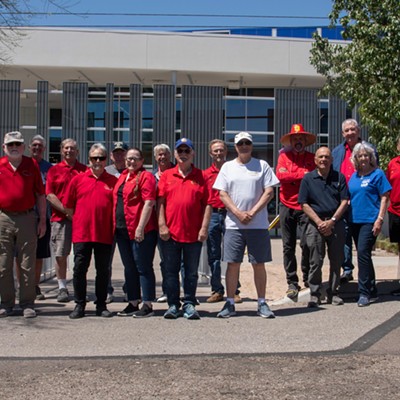The Teamsters
Kirk feels lucky to be able to stand at the Ronstadt Transit Center on this Friday morning, as part of 530 other Sun Tran bus drivers and mechanics striking for fair pay, better security and a mold-free work environment.
In November, Kirk was stabbed twice while on the job—once in the chest and another in the neck. A young man at the Roy Laos Transit Center attacked him, while he took a break from his night shift driving route 11. Kirk, who asked that we not share his last name, says there was only one security guard around. The young man hit the security guard in the head, and then went after Kirk.
The neck wound could have been fatal, but the knife blade hit his collarbone. The stab in the chest didn't hit any vital organs, either.
Kirk, a bus driver for the past six years, was off work for two weeks.
"(Sun Tran's) management explained to me the process of going on workers compensation ... that is really all the interaction I had from them regarding this case," he says, sitting in the shade, holding a picket sign. That Friday marked the strike's ninth day. "There haven't been major changes in security."
Shortly after his return, he had an altercation with a bus rider who snuck in a beer. The man ended up throwing the beer in Kirk's face, after Kirk asked him to get rid of it. "Passengers realize that there is no accountability ... the disrespect ... they don't have to abide by any rules," he says.
All-in-all, there have been 22 assaults on bus drivers in the past 13 months, according to the Teamsters Local Union 104, which is leading the strike. That includes beer-throwing, spitting and more violent incidents.
"When I am on my job, doing what I am supposed to be doing for a living, I should be entitled to protection, the company should be looking out for our safety," he says. "I feel it is not a priority of theirs."
Kandi Young, Sun Tran's marketing and communications director, argues the company has worked side-by-side with the union to establish a safety committee, and have implemented the use of off-duty police officers on buses and at bus stations.
Still, the assaults, wage woes, and a massive mold problem at a Sun Tran maintenance facility in northwest Tucson created the perfect storm.
"It is a health problem, too ... this mold has gone on for years and we just found out two weeks ago. Assault has been there as long as I have been here, safety issues. They are not willing to protect us from assault. Financially, we are (among) the lowest paid mass transit operation in the United States, but this (mold) really took the cake," says a bus driver who's been with Sun Tran for 12 years, asking that he not be identified. "Without health, the rest of this doesn't matter. Passengers, of course, are upset, thinking we are here just for money, but this is also an issue they have to deal with. (The mold) is in the buses, ventilation system, they don't understand that. I love my job, or I wouldn't be here."
Wages
Members of the Teamsters Local Union 104 have been on strike for 15 days now. It began at midnight on Aug. 6, when the union and Sun Tran reps didn't agree on each other's proposals for a new contract.
Sun Tran's offer included a raise of 50 cents (from $13.30 to $13.80) for drivers starting out, an 11th paid holiday, and continued company-supported pension and health coverage. It didn't include pay raises for current workers, at least for the next three or so years. The union wanted at least a 75-cent raise for workers in their first year, a $1 raise for their second and third year, and for Sun Tran to unfreeze wage progression for all other employees.
During 2013 negotiations, the Teamsters were told by Sun Tran management that there weren't enough funds to support raises, so the union launched an independent audit, which last year revealed that Sun Tran returned a total of $2.2 million to the city in 2013 and 2014, money that was specifically meant to go toward wage increases and benefits, according to Andrew Marshall, the Teamsters Local Union 104's secretary and treasurer.
Sun Tran says, on average, drivers make $16.72 an hour, with more than half making $19.22. About the $2.2 million, the company claims it was Regional Transportation Authority money for service expansion, and because of that, it couldn't be used for anything else, such as raises.
"The Teamsters' proposal is unsustainable. Even with the poor economic situation over the last seven years and at a time when wages and benefits have been cut for many in our community, Sun Tran has been able to maintain a competitive compensation package," said Kate Riley, Sun Tran's general manager, in a statement to the media. "For example, a total compensation package for an entry level coach operator when you evaluate annual earnings, pension and medical, dental and vision benefits is worth over $46,000."
In total, the Teamsters' demands would increase the city of Tucson's general fund contribution to the transit company by $20.3 million over the next three years, according to Sun Tran.
But Marshall says the figures Sun Tran used are outdated. "That simply was the proposal on the table when (Sun Tran) cut off negotiations. The final offer we gave to the mediator is $5.7 to $7.7 million, depending on how (they) calculate the frozen wages progression," he says.
Mold
Sun Tran has known about the mold issue at least since 2010, when the company first built the northwest maintenance facility, according to Marshall. In 2012 and 2013, a testing company verified there was mold there, but Marshall says Sun Tran didn't do anything to fix it. What's worse to Marshall is the fact Sun Tran is telling employees to deal with the mold, rather than hiring professionals to clean up the mess, he says.
"They are acting like it is not a big deal, and it is absolutely crazy," he says. "Respiratory diseases from this mold can be fatal. I don't know what they are trying to accomplish here."
Young says Sun Tran found out about the mold in July, and that they've dealt with it the same way they have in the past. It's particularly challenging during the monsoon, but they have ran three quality tests at the facility, and "the air quality is higher than the air outside," she says.
For now, there are pending unfair labor practice charges against Professional Transit Management—the company hired by the city to oversee Sun Tran—which means those involved in the strike cannot be fired or replaced. None of the drivers and mechanics are getting paid for the time they're picketing though, and Marshall says this is saving Sun Tran at least $750,000 every week the strike's still on. "They are not in a hurry to do anything," he says. "They talk about how they care about the public, they don't care. They are making money off of them and us."
Last Thursday, the union brought a federal mediator on board to help with negotiations. By press time on Tuesday, no meetings had happened. Merely eight of 43 routes are in transit, leaving the roughly more than 60,000 passengers scrambling to find other transportation options.
Stuck in the Middle
Julie Vander Weken lost her job two weeks ago. The bus routes she takes to get to work haven't been around since the strike began.
On Friday morning, she stood in a corner across the street from Ronstadt with a small group of bus riders protesting the Teamsters' strike. She calls the union greedy, and wonders "how they can sleep at night," knowing there are thousands of people like her, who struggle to make a living and depend on the bus to get to work.
"I couldn't pay my rent and I am facing eviction," she says. "(The drivers) should be grateful to have a job, paid holidays, I would be lucky to get Christmas or Thanksgiving off on my job."
It's not that she's against unions. What angers her is what she refers to as unrealistic demands from the Teamsters. She wants the strike to end, but she pleads Sun Tran not to give into the union's proposals, because "they do not deserve it and we cannot afford it."
Then there are people like Maricela Teran Martinez-Whitmore, who's been able to drive her son to his part-time job at Jim Click. For her son, who has autism, sticking to the routine helps him through the day. Prior to the strike, he'd be on the bus by 7:30 a.m. to get to his 8:30 a.m. to 12:30 p.m. shift. There's Sun Van, a service for people with disabilities that has not been affected by the strike, but Teran Martinez-Whitmore's son doesn't qualify for it.
"What helps him the most is his life skills and his routine, when you are off the routine it becomes stressful for the individual with disabilities," she says. "Yes, it is affecting us, but he is fortunate that I am able to (help), but what if he didn't have me?"
Eight routes are running on a limited Monday through Friday 6 a.m. to 6 p.m. schedule.
The Teamsters and Sun Tran say they sympathize with the bus riders, but a resolution hasn't emerged yet.
"They gotta get to school, they gotta get to work and they are mad," says Karla Schumann, vice-president of the Teamsters Local Union 104. "The face of Sun Tran isn't the corporation, it isn't the business, it is the drivers. (The bus riders') animosity and hostility is directed toward the drivers, not the company. It is very easy for people to point a finger and say, 'you have enough, you should be grateful.' People are very blessed and they have great benefits, but they are well below what other drivers make in other parts of the country and even in Arizona. I get it. I respect (the bus riders' right to be out here (protesting the strike), just like we have a right to be doing what we are doing."










